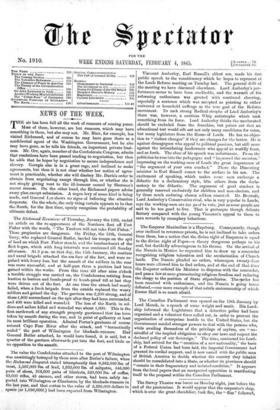The Richmond Examiner of Thursday, January the 12th, ended an
article on the re-appearance of the Northern fleet off Fort Fisher with the words, " The Yankees will not take Fort Fisher." These prophecies are dangerous. On Friday, the 13th, General Terry, who replaced General Butler, landed his troops on the spit of land on which Fort Fisher stands, and the bombardment of the fleet began, which with long intervals was continued, till Sunday afternoon. At 3 p.m. on that day, the 15th January, the marines and naval brigade attacked the sea face of the fort, and were re- pulsed with heavy loss, but the assault of the soldiers in the rear was more successful, and at half-past three a position had been gained within the works. From this time till after nine o'clock a terrible struggle was carried. on, the Confederates retiring from bastion to bastion and bomb-proof to bomb-proof till at last they were driven out of the fort. At one time the attack had nearly failed, when a fresh brigade from the outside replaced the weary soldiers and gained the day. The garrison was 2,200 strong, and of these 1,800 surrendered on the spit after they had been surrounded, and 400 were killed and wounded. The loss of the North in sol- diers and sailors killed and wounded was about 1,000. This is the first earthwork of any strength properly garrisoned that has been taken by assault during the war, and in point of gallantry at least its most brilliant operation. Admiral Porter's gunboats of course entered Cape Fear River after the attack, and "hermetically sealed " the port of Wilmington for blockade-runners. had General Butler attacked, he would have found, it is said, but a quarter of the garrison afterwards put into the fort, and little or no opposition to the assault.






























